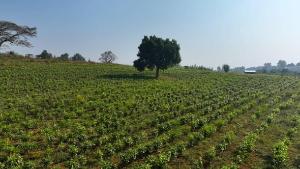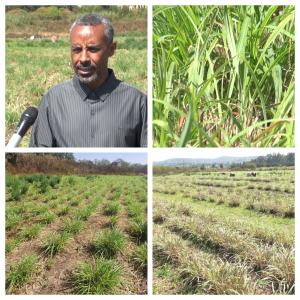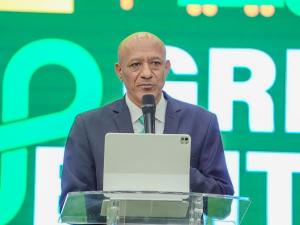Environment - ENA English
Environment
Harnessing Africa’s Untapped Agricultural Potential Requires Deliberate Shift: IGAD Official
Mar 3, 2026 856
Addis Ababa, March 3, 2026 (ENA) – Transforming Africa’s agriculture into a climate resilient productive and competitive system needs a deliberate shift, IGAD Agriculture and Environment Division Director, Daher Elmi, said. Addressing a two-day forum on Scaling Climate Smart Agriculture in Eastern and Southern Africa, the Director said Africa possesses the world’s largest scale of uncultivated land, the youngest population, and fast growing digital and innovation ecosystem. As harnessing these opportunities requires a deliberate shift, we must transform Africa’s agriculture into a climate resilient productive and competitive system, he pointed out. Climate smart agriculture is at the heart of this transformation, Elmi noted, adding that the response must be regional as no country can confront climate change alone, and food systems as climate shocks are regional. In this spirit, he stated that IGAD is undertaking several strategic initiatives that directly support scaling of smart agriculture and transform food systems in the region. Natural Resource and Climate Change Program Director at the Ethiopian Agricultural Transformation Institute, Awoke Mulualem, said climate smart agriculture is essential for making the food systems in Ethiopia more productive, more resilient, and sustainable. Noting that climate smart agriculture is part of the broader efforts of the country’s plan in the sector, he added that Ethiopia is taking concrete steps towards climate smart agriculture. “We are restoring degraded lands and improving water retention in these areas. And we are enhancing soil health with better nutrient management.” Such actions align with the national and regional agricultural plans, the Director stated, citing the establishment of a Climate Smart Agriculture Center of Excellence in the country and the development of a digital platform which helps translate policy into practice. The Program Director also emphasized the significance of enhancing national and regional collaboration to realize climate smart agriculture in the region and beyond. New Zealand’s Ambassador to Ethiopia, Olivia Owen, said for her part that agriculture underpins livelihoods, food securities, and economic transformations in every country. “We are here today because we are committed to enhancing climate resilience, realizing food security, and reducing emissions.” Stating the significance of supporting climate smart agriculture, innovation and scaling for food security, the Ambassador noted that regional cooperation and meetings like this are absolutely indispensable. Similarly, Senior Agricultural Specialist at World Bank, Tim Robertson, said climate smart agriculture is critically important, stressing the need to accelerate collaboration among all stakeholders to unlock Africa’s ample agricultural potential. The Specialist underlined the significance of technology for climate smart agriculture further pointing out the need for more innovation and creativity.
Triple Planetary Crisis Threatens Eastern Africa’s Food Security, Ministry Warns
Mar 2, 2026 2519
Addis Ababa, March 2, 2026 (ENA) – The Ministry of Planning and Development has announced that the triple planetary crisis, comprising climate change, biodiversity loss, and pollution, is severely threatening food security across Eastern Africa. State Minister of Planning and Development Seyoum Mekonnen emphasized that the convergence of these three issues is eroding decades of hard-won economic development. Speaking today at the opening of a four-day Global Environment Facility (GEF) Expanded Constituency Workshop in Addis Ababa, the state minister stressed that environmental protection can no longer be treated as a secondary agenda. “Environmental protection is no longer a distant agenda but the frontline of our survival and the foundation of our future prosperity,” he said. He noted that Eastern Africa is grappling with erratic weather patterns, prolonged droughts and accelerating ecosystem degradation. These pressures, he said, are displacing communities, straining livelihoods and placing mounting burdens on national economies. Seyoum underlined Ethiopia’s commitment to aligning climate action with sustainable development. He cited flagship initiatives including the Green Legacy Initiative, which he said has planted more than 48 billion seedlings over the past seven years, and major renewable energy investments such as the Grand Ethiopian Renaissance Dam. He also highlighted large scale urban corridor development programs, sustainable food system reforms under the YeLemat Tirufat initiative and Ethiopia’s decision to ban the import of fossil fuel-based passenger vehicles to accelerate the transition to electric mobility. Recalling that Addis Ababa hosted the Second Africa Climate Summit in September 2025, the state minister said the gathering adopted the Addis Ababa Declaration and marked what he described as a turning point in Africa’s climate narrative. “It signaled a shift from victimhood to solution driven leadership,” he said. He added that Ethiopia’s selection to host COP32 in November 2027 reflects the country’s expanding role in global climate leadership. Despite these efforts, Seyoum cautioned that global climate and environmental finance remain far below what is required. While acknowledging the central role of the Global Environment Facility, he called for faster approval processes and increased financial flows to developing countries, particularly in Africa. “For Eastern Africa, GEF financing must unlock transformative change,” he said, urging participants to enhance access to funding, prioritize country driven and results oriented projects and strengthen regional partnerships to confront the triple planetary crisis. GEF Africa Coordinator Jonky Tenou, on his part, said Eastern Africa, though rich in environmental assets and resilience, faces interconnected challenges including climate variability, biodiversity loss, land degradation and pollution, many of which cross national borders. According to Tenou, the workshop aims to enable Eastern African countries to engage more effectively, coherently and strategically within the GEF partnership framework to address shared environmental threats. Two major climate financing mechanisms are currently supporting African countries, including Ethiopia, in tackling climate change through adaptation efforts and low carbon development initiatives, he noted. According to him, one financing window is specifically dedicated to climate adaptation, with a strong focus on least developed countries, while a separate trust fund assists nations in shifting their economies toward low emission growth. Together, the two mechanisms constitute the central pillar of climate finance support across the continent, he noted. He also highlighted Ethiopia as one of the countries demonstrating notable progress in effectively utilizing these resources. The projects underway are advancing steadily and reflect strong coordination between the government and international implementing partners in driving adaptation measures and low emission development objectives, he added.
Ethiopia’s Future Hinges on Green and Planned Urban Development, PM Abiy Says
Feb 4, 2026 4717
Addis Ababa, February 3, 2026 (ENA)—Prime Minister Abiy Ahmed said Ethiopia’s long-term prosperity hinges on building green, resilient and well-planned cities that promote development while safeguarding natural resources. He cautioned that unplanned urban expansion could push the country toward serious environmental crises, stressing the need for urban growth that balances economic progress with environmental protection. Addressing the 10th regular session of the fifth year of the House of Peoples’ Representatives, the Prime Minister said the scale of urban and corridor development under way across the country is already reshaping Ethiopia. “The transformation that is currently taking place in Ethiopia through urban development and corridor development is very clear and visible,” Abiy said. He noted that the effort has gone beyond Addis Ababa and has become a nationwide movement modernizing city across the country. Abiy cautioned that rapid population growth, if not matched by proper planning, would place heavy pressure on urban centers and existing infrastructure. “If urban development is not carried out in a planned manner, population growth will inevitably put a lot of pressure on cities,” he said. The Prime Minister stressed that creating cities that provide diverse services and a balanced environment is essential to ensuring safety, mobility and a healthy urban life for citizens. Reflecting on global experience, Abiy said the development paths of Western and Asian countries offer important lessons. “The development experience of both Western and Asian countries provides a great lesson for the world,” he said, adding that while their prosperity is admirable, it has often come at a significant cost to the environment. He pointed out that some developing countries are now spending up to nine percent of their gross domestic product to address the impacts of climate change, noting that pollution has already paralyzed parts of Asia. “In Asia, there are cities that are so polluted that they cannot even land or take off,” he said. Reaffirming Ethiopia’s green economic reform agenda, the Prime Minister said the country is determined to avoid past mistakes by ensuring that development progresses in harmony with nature. He cited initiatives such as the Green Legacy program, which focuses on restoring degraded landscapes, and riverside development projects aimed at rehabilitating urban waterways, as concrete examples of this approach. “In general, every citizen should realize that sustainable development can only be achieved when it is possible to travel without polluting or harming nature,” Abiy said. He added that ongoing urban corridor development remains central to Ethiopia’s future. “The urban corridor development that is currently being implemented is a strategic step that will improve the quality of life of citizens, harmonize modernity with nature, and hand over a better country to the next generation,” the Prime Minister said.
Ethiopia Shifts from Emergency Relief to Climate Resilience through Water Investment: Ministry
Feb 2, 2026 5239
Addis Ababa, February 2, 2026 (ENA)— Ethiopia has shifted away from short term emergency responses to a long-term climate resilience strategy anchored in water infrastructure, according to Ministry of Water and Energy. In an exclusive interview with ENA Minister of Water and Energy Habtamu Itefa noted that the country has faced recurring droughts across multiple regions for three to four decades, forcing successive governments to rely largely on population relocation and emergency assistance to save lives. “That approach is changing,” the minister said, stressing that national policy now focuses on building resilience at the source. “Resilience means people do not have to leave their land when drought happens.” He explained that the government is prioritizing localized water solutions, including groundwater development, rainwater harvesting, flash flood capture and the construction of small-scale dams at kebele and woreda levels. According to the minister, these interventions are already transforming livelihoods in drought prone areas. “In places like Borana, communities are now able to grow crops such as wheat, which was previously unthinkable,” he added. The minister also noted that in the Somali, Afar and Tigray regions, the federal government has for the first time allocated treasury funds to climate resilient water, sanitation and hygiene projects, improving access to water for both people and livestock. He further pointed to solar powered water supply systems in Afar, where the absence of electricity had long constrained economic activity despite large livestock holdings. The initiatives aim to ensure sustainable water supplies for domestic use and livestock by tapping both groundwater and surface water resources, he added. “When climate shocks come, people should not run to beg,” the minister said, adding, “They should rely on their own water, food systems and energy.” Minister Habtamu also urged African Union member states to adopt similar resilience-based approaches, warning that climate impacts do not respect borders and instability in one country inevitably affects its neighbors. “We are really seeing a wonderful fruit, a wonderful achievement from this kind of policy, and this has to be disseminated among our African countries as well,” he stated. According to him, Ethiopia’s experience demonstrates that climate resilience is achievable through water security, renewable energy and local investment, offering a practical model for Africa in line with Agenda 2063. Complementing these efforts, Ethiopia has planted more than 40 billion seedlings over the past six years under the Green Legacy Initiative, launched in 2019 by Prime Minister Abiy Ahmed to combat deforestation, expand forest coverage and strengthen national climate resilience.
Norway Hails Ethiopia’s GLI Commitment, Reaffirms Climate , Forestry Partnership
Jan 30, 2026 4913
Addis Ababa, January 30, 2026 (ENA) - Norway has praised Ethiopia’s Green Legacy Initiative (GLI) and reaffirmed its long-standing partnership with the country on climate action, forestry preservation, and sustainable livelihoods, Norwegian Ambassador to Ethiopia Stian Christensen said. The ambassador said to ENA exclusively that Norway’s cooperation with Ethiopia on climate and forestry stands as the largest and most significant component of the bilateral partnership, anchored in the Ethiopian government’s strong political commitment. “The reason for our long-standing support and cooperation and partnership with Ethiopia on this file, on climate and forestry, is the Government of Ethiopia's commitment, spearheaded by the Prime Minister himself, on preserving forests,” Ambassador Christensen said. “…, this is by far the biggest component of our bilateral partnership as well.”, he added. He noted that Norway’s Climate and Forestry Programme with Ethiopia focuses on forestation, reducing deforestation, and ensuring sustainable livelihoods that go hand in hand with environmental protection—an approach he said is vital not only for Ethiopia but also for the wider region. According to the ambassador, Norway works closely with key Ethiopian institutions, including the Ministry of Agriculture, the Ministry of Finance, and the Ministry of Planning and Development, to ensure that climate and forestry efforts reach communities at the grassroots level. “The point is to go down to the local level, where people live, and work together with the Ethiopian Government and the local farmers, the local population out there, to try to create an environment where they see the benefit in protecting their forests, by facilitating livelihoods that go hand in hand with the preservation of forests,” he explained. He described the cooperation as a multi-layered partnership involving federal, regional, and local authorities, aimed at strengthening Ethiopia’s capacity to deliver sustainable environmental outcomes. “For us, it’s about supporting Ethiopia’s ability to do this job, which it is committed to doing,” Christensen said, adding that he sees “a lot of capacity at government level, at regional level, and at local level by now.” The ambassador said tangible results are already visible on the ground, particularly in reforestation efforts being carried out across the country. “You see it also in the results, in the reforestation that is happening in Ethiopia now,” he said. “I’m really encouraged by that, by the GLI, which goes hand in hand with it, spearheaded by the Prime Minister.” Beyond climate and forestry, Christensen highlighted Norway’s support for Ethiopia’s agricultural value chains, particularly through the UNIDO Global Market Access Programme (GMAP), which focuses on strengthening sectors such as apiculture from production to market. He said Norway, through the Norwegian Agency for Development, has been supporting the programme for several years, with a strong emphasis on inclusivity. “The inclusion of women and youth is a key component of the Global Market Access Programme,” he said. “That remains a very strong Norwegian priority across the globe in all the support we do—not just for moral reasons, but also because it makes a lot of economic success.” The ambassador also pointed to growing cooperation in higher education, technology, and digital transformation, including collaboration on Ethiopia’s digital ID agenda, and expressed Norway’s readiness to explore further partnerships in these areas. On regional and strategic issues, Christensen said Norway recognizes Ethiopia’s national priorities, including the importance of access to the sea for the country’s long-term development. “We certainly recognize the importance of access to the sea for such a huge country,” he said, expressing confidence that Ethiopia will find sustainable solutions through existing and potential routes. Ambassador Christensen underscored that Norway’s partnership with Ethiopia is built on long-term commitment, mutual trust, and shared goals, particularly in advancing climate resilience, sustainable development, and inclusive economic growth.
Ethiopia, EU Pledge Closer Cooperation on Development and Regional Security
Jan 28, 2026 7964
Addis Ababa, January 28, 2026 (ENA) -State Minister for Foreign Affairs, Ambassador Hadera Abera, on today held talks with the European Union Special Representative for the Horn of Africa, Annette Weber, reaffirming Ethiopia’s commitment to further consolidating its longstanding partnership with the European Union. During the discussions, Ambassador Hadera underscored the strategic importance of Ethiopia’s partnership with the European Union. He noted that cooperation between Ethiopia and the European Union spans more than five decades, covering key areas such as economic development, peacebuilding, and regional security. Both sides emphasized the importance of further enhancing political dialogue, deepening economic cooperation, and strengthening collaboration on regional and multilateral issues of mutual interest.
IGAD Climate Prediction and Applications Center Pledges Strong Coordination to Deliver Regional Climate Services Framework
Jan 26, 2026 3045
Addis Ababa, January 26, 2026 (ENA) -The IGAD Climate Prediction and Applications Centre (ICPAC) has reaffirmed its commitment to developing a joint action plan to ensure the successful implementation of the IGAD Regional Framework for Climate Services (RFCS). The pledge was made during the 72nd Greater Horn of Africa Climate Outlook Forum (GHACOF72), currently underway in Nairobi under the theme “Advancing Climate Services for Resilient Communities and Sustainable Development in the Greater Horn of Africa.” The hybrid forum has brought together climate scientists, government institutions, development partners, media, and civil society representatives from across the region. Addressing the two-day forum, ICPAC Director Abdi Fidar highlighted the Horn of Africa’s high vulnerability to climate variability and extreme weather events, including recurrent droughts, floods, and increasing land degradation. “These realities reinforce the critical importance of GHACOF as a regional platform for consensus building, shared understanding of climate risks, and coordinated early action,” he said. Fidar emphasized ICPAC’s close collaboration with national meteorological and hydrological services, sector ministries, the World Meteorological Organization (WMO), and development partners. He noted that the center has made significant progress in strengthening regional climate prediction, monitoring, and the delivery of user-oriented climate services. “GHACOF remains central as a mechanism for producing seasonal climate outlooks and translating climate information into actionable steps,” he added. The IGAD Regional Framework for Climate Services was launched and endorsed in September 2025 during the Second Africa Climate Summit in Addis Ababa. The framework provides a coordinated, user-centered approach to improving the generation, dissemination, and application of climate services across the IGAD region. However, Fidar stressed that the framework’s impact will depend on effective implementation, strong coordination, and sustained partnerships. He confirmed ICPAC’s readiness to work closely with national meteorological and hydrological services, government institutions, development partners, research and academic institutions, the private sector, and civil society organizations to jointly develop and implement an action plan. Such collaboration, he noted, is essential to ensuring climate information supports early action, disaster risk reduction, climate-resilient development, and long-term planning throughout the Greater Horn of Africa. Organized by ICPAC, GHACOF remains one of the region’s key climate forums, providing a critical platform for cross-sectoral dialogue on seasonal climate outlooks and emerging climate challenges.
Ethiopia, Norway Strengthen Collaboration on Forest and Climate Finance: Ministry of Finance
Jan 21, 2026 3666
Addis Ababa, January 21, 2026 (ENA)— The Ministry of Finance said that Ethiopia and Norway have vowed to strengthen their collaborations on forest and climate finance. The Ministry of Finance recently convened the Joint Consultation Group under the Ethiopia-Norway Partnership on Forest and Climate Change. Co-chaired by Semereta Sewasew, Ethiopia's State Minister of Finance, and Stian Christensen, the Norwegian Ambassador to Ethiopia, the two parts held a meeting focused on advancing strategic operations in forest conservation and climate finance. According to a press release by the ministry, the meeting also focused on reviewing progress under the 2024 Partnership Agreement and shaping the future direction of the REDD+ Investment Program beyond June 2026. Semereta Sewasew emphasized that climate change is an immediate and tangible challenge for Ethiopia, with recurrent droughts and floods affecting livelihoods, food security, and economic stability. She reaffirmed the government’s strong commitment to the partnership and highlighted the importance of sustainable and participatory forest management. By involving local communities in forest stewardship, Ethiopia aims to align conservation objectives with economic incentives, reduce deforestation pressures, strengthen social cohesion, and safeguard long-term forest productivity. The meeting also acknowledged the leadership of PM Abiy Ahmed’s Green Legacy Initiative (GLI), which has strengthened coordination across federal, regional, and local institutions and contributed to Ethiopia being selected as host of COP32 in 2027. According to Semereta, Norway has been a foundational partner in Ethiopia’s REDD+ architecture since 2013. Beyond financing, Norway has supported institutional, technical, and fiduciary capacity development across government institutions responsible for forest management, climate policy, land administration, and environmental protection. This support has strengthened Measurement, Reporting, and Verification systems, safeguards, and carbon accounting frameworks, enabling Ethiopia to advance towards results-oriented forest climate finance. She further noted that carbon credit transactions under the partnership are nearing finalization, reflecting the maturity of Ethiopia’s institutional systems and the effectiveness of Norway’s capacity-building support. The anticipated completion of these transactions will mark a major milestone in Ethiopia’s transition toward market-linked climate finance. Ambassador Stian Christensen also commended Ethiopia’s strong ownership and progress, emphasizing Norway’s continued commitment to supporting the country as it works towards results-based payments, an approach that rewards verified outcomes, reinforces accountability, and promotes long-term sustainability. The forest sector remains a central pillar of Ethiopia’s economic and environmental resilience. Well-managed forests enhance agricultural productivity, stabilize water systems, reduce land degradation, and improve resilience to climate shocks, while participatory management ensures these benefits are shared equitably. Strong institutional leadership, supported by Norway’s long-term partnership, is essential for sustaining these outcomes, the ambassador added. Dyveke Rogan, the Deputy Director of Norway’s International Climate and Forest Initiative (NICFI) noted that the REDD+ Investment Program III will follow a blended financing framework for 2026–2030. She added that the program will build on Norwegian support of USD 60 million, USD 40 million from the Green Legacy Initiative Special Fund, and additional resources carried forward. The next phase aims to deepen participatory forest management, strengthen institutional coordination, accelerate land restoration, and advance Ethiopia’s work towards results-oriented forest finance while mobilizing private sector investment. Semereta expressed her deep appreciation for Norway’s sustained partnership and innovative financing approaches, emphasizing that Norway’s support has been instrumental in positioning Ethiopia as a credible leader as it works towards results-oriented forest climate finance, empowering communities, and ensuring long-term economic, environmental, and climate resilience.
Experts Applaud Ethiopia’s Anti-Plastic Drive, Urban Green Spaces for Protecting Community Health
Jan 17, 2026 5939
Ethiopia’s expanding efforts to curb plastic pollution, limit exposure to toxic chemicals, and increase urban green spaces are earning praise from international health and environmental experts. The experts told ENA that the measures could significantly reduce cancer risks among children and strengthen the country’s position as a leader in sustainable development in Africa. Experts noted that environmental protection plays a critical role in disease prevention, particularly for vulnerable populations such as children, and emphasized that Ethiopia’s proactive approach could yield long-term public health benefits. Dr. Bronwyn McNamara, a primary healthcare practitioner from Australia, said Ethiopia’s environmental policies are already producing visible improvements. “I can see a big difference, and I really acknowledge that the Ethiopian Environmental Protection Authority (EPA)is addressing issues related to plastic and chemical contaminants,” she said. Dr. McNamara stressed that prevention through environmental protection is essential to safeguarding public health. “It’s a very important area to prevent health issues in your population,” she noted. She also commended Ethiopia’s investment in urban parks and green spaces, highlighting their wide-ranging health benefits. “The green areas and making areas specifically for parks—I can congratulate that initiative,” she said. According to McNamara, green spaces promote physical activity, social interaction, and improved air quality. “It helps get people exercising, interacting, and children playing in green areas,” she explained, adding that trees and plants help produce oxygen and remove environmental contaminants. Prof. Sheila Weitzman of the University of Toronto echoed these views, emphasizing that environmental improvement is a long-term investment in public health, particularly for children. “Improving the environment eventually has to make an impact—that’s the goal,” she said. “If we can prevent illness, that is much better than treating it.” She underscored the importance of shifting from reactive medical interventions to proactive prevention strategies to protect future generations. Firew Kefyalew, East Africa Director of Pure Earth and a prominent environmental advocate, drew a direct connection between plastic pollution and increased health risks among children, including cancer. “Cleaning environments benefits us all—ourselves, our future, and our children,” he said. Firew emphasized that reducing plastic pollution begins with individual responsibility. “You do not clean to please others; you clean it for yourself, for the future, and for children,” he stated. Calling for collective action, he urged the public to refrain from using single-use plastic products and promoted plogging—picking up litter while jogging—as a simple and effective way to protect children’s health, reduce disease risks, and build a sustainable environmental legacy for Ethiopia.
Ethiopia Adopts Comprehensive Vision to Transform Riverbanks into Engines of Sustainable Urban Growth
Jan 16, 2026 3517
Addis Ababa, January 16, 2026 (ENA)—Riverside development in Ethiopia is guided by a comprehensive vision that goes beyond simply treating or restoring river streams,” Office of the Prime Minister said. According to the social media post by the office, the approach focuses on integrated infrastructure development along riverbanks, with buffer zones that may extend beyond or fall within 50 meters on each side depending on the area and local conditions. By organizing land use within these corridors, the initiative aims to reduce pollution and flood risks, restore ecosystems, and create public spaces, mobility networks, and economic opportunities. This flexible and holistic strategy is transforming riverbanks into well-managed, productive, and livable environments that support sustainable urban growth and community well-being.
PM Abiy Calls Nationwide Environmental Mobilization
Jan 13, 2026 3618
Addis Ababa, January 13, 2026 (ENA)—Prime Minister Abiy Ahmed called for a nationwide campaign to protect Ethiopia’s natural resources, stressing the urgency of tackling soil loss that he described as “extremely difficult to replace.” “Let Us Rise Up, Let Our Hands Touch the Soil, and Let Us Build Our Country”, PM Abiy made the calls on social media post today. “Because our environmental protection system is weak, we have been losing our fertile soil, which is extremely difficult to replace once it is gone,” the Prime Minister wrote. He welcomed the cooperative efforts between the people and government, saying it is “encouraging that the environmental protection work, begun through cooperation between the people and the government, has started in this way before the rainy season arrives.” PM Abiy further urged collective responsibility for conservation. “Let the development and conservation of our natural resources in every way be our collective duty,” he said, adding a call to action “Let us rise up, let our hands touch the soil, and let us build our country!”
Ethiopia’s Leadership in Global Energy Transition Highlighted at IRENA Assembly in UAE
Jan 13, 2026 3751
Addis Ababa, January 13, 2026 (ENA)—Ethiopia’s role as a global leader in the energy transition was underscored during the 16th Assembly of the International Renewable Energy Agency (IRENA), held in the United Arab Emirates. Delivering Ethiopia’s message at the assembly, Ambassador Jemal Beker said the country, as a founding member of the Accelerated Partnership for Renewables in Africa (APRA), is at the forefront of efforts to advance Africa’s transition toward a green economy. He noted that Ethiopia derives more than 98 percent of its energy from renewable sources and has introduced transformative policy measures, including a ban on fossil-fuel vehicle imports, positioning the country as a pace-setter for a green industrial revolution. IRENA, the world’s leading intergovernmental organization for renewable energy, serves as its top decision-making body, setting the global agenda, approving budgets, endorsing work programs, and strengthening international cooperation to accelerate the energy transition. The assembly comes amid shifting global dynamics, taking place just days after the United States announced its intention to withdraw from IRENA. During the opening plenary on Sunday, Kenya was elected Vice President of the 16th Assembly, representing Africa. Ambassador Jemal reaffirmed Ethiopia’s commitment to sharing its experience in carbon-free energy development, highlighting the Grand Ethiopian Renaissance Dam (GERD) as more than a power project, describing it as a symbol of regional integration and climate resilience. “Our message is clear: the future is renewable, and Ethiopia is ready to lead,” he said in a social media post. He further stated that Ethiopia will play an active role in helping the continent achieve the Nairobi Declaration goal of tripling renewable energy generation capacity by 2030. Ethiopia’s policy initiatives promoting green industrial development powered by renewable energy and expanding access to electric vehicles were also presented as best practices for partner countries. Looking ahead, Ambassador Jemal noted that the 32nd UN Climate Change Conference (COP32), which Ethiopia is set to host in 2027, will provide a major platform for APRA member states to showcase their achievements. He called on partner nations to stand in solidarity with Ethiopia in preparation for the event. The Accelerated Partnership for Renewables in Africa (APRA) was established in September 2023 and currently includes 10 African countries, with Ethiopia among its founding members.
Ethiopia’s Agricultural Reforms Attract Global Partners as Food Sovereignty Gains Momentum
Jan 11, 2026 5337
Addis Ababa, January 11, 2026 (ENA)—Ethiopia’s ongoing agricultural reforms are reinforcing national food self-reliance while attracting growing interest from international development partners, according to a senior official from the Canadian Food Grains Bank (CFGB). CFGB Senior Program Manager Hailemariam Menamo said Ethiopia’s policy-driven transformation of the agricultural sector is delivering measurable results in sustainability, conservation agriculture, and domestic wheat production. Speaking to ENA, Hailemariam noted that the government’s structured and forward-looking agricultural strategy has created a strong foundation for coordinated global engagement. “These reforms are improving sustainability while also creating space for international organizations to collaborate more effectively,” he said. “Partners are now able to align resources and share knowledge to address complex food security challenges.” He emphasized that Ethiopia’s policy environment has enabled development actors to work in a more integrated manner, enhancing the overall impact of agricultural and food security programs. A central pillar of this progress, he explained, is the close cooperation between CFGB and the Ethiopian government, particularly in promoting conservation agriculture. This approach seeks to increase productivity while protecting soil health, water resources, and surrounding ecosystems. According to Hailemariam, these efforts are increasingly evident in Ethiopia’s push to expand local wheat production. New government guidelines have helped farmers improve yields and reduce dependence on imported grain. “Wheat has traditionally been grown in exporting countries like Canada,” he said. “But Ethiopia is now producing wheat locally by empowering farmers with the right policies, training, and research support.” CFGB and its partners are working with farmers to boost productivity on smaller plots of land, while collaborating with research institutions and government scientists to adapt high-yield practices to local conditions. He added that combining hands-on farmer training with locally led research ensures that improved techniques are effectively applied across both smallholder and large-scale farming systems. Reflecting on his experience across Eastern Africa, Hailemariam praised Ethiopia’s leadership and long-term commitment to agricultural development. “I have visited many countries in the region, and what Ethiopia is achieving stands out,” he said. “The progress we see today is the result of strong policy direction and national ownership.” He also highlighted Ethiopia’s Green Legacy Initiative, noting CFGB’s involvement in tree planting and biodiversity enhancement. Youth cooperatives, he said, are playing a key role by managing nurseries that produce agroforestry crops such as avocado and mango. “These young farmers are creating new income opportunities while contributing to environmental restoration,” he said.
Norwegian Development Fund Applauds Ethiopia’s Soil, Water Conservation Efforts Under Green Legacy
Jan 10, 2026 4703
Addis Ababa, January 10, 2026 (ENA)—The Norway’s Development Fund has praised Ethiopia’s soil and water conservation efforts as a decisive step forward for the national Green Legacy Initiative (GLI). Speaking exclusively to ENA, Head of Programs at Norway’s Development Fund, Sisay Kassahun, said Ethiopia’s sustained conservation measures are reversing decades of environmental degradation caused by deforestation and land misuse. He recalled that Ethiopia’s forest cover once stood at 25 to 30 percent but declined sharply over generations, triggering severe soil erosion, recurring droughts, bio-diversity loss and heightened exposure to climate extremes such as floods and heat waves. “It’s very much a permanent, it’s a decisive measure that we need to take the Green Legacy initiative moving forward. Because you see, we lost in our childhood, the forest coverage of Ethiopia was about 25 to 30 percent. But since the GLI, there are indications that the forest coverage of Ethiopia is just increasing now,” Sisay said. According to him, protecting soil through large scale tree planting and vegetation management is not only an environmental priority but also a matter of national survival, agricultural productivity and rural livelihoods. He highlighted agro-forestry as a central strategy, particularly for smallholder farmers who cultivate limited land. Average household plots, he noted, are about half a hectare, making extensive farming impractical. “It’s our strategy to promote agro-forestry to our smaller farms. Within a limited area of land, farmers will be advised to plant trees for food, like papaya, avocados and mango. The average household land size is about 0.5 hectare, so you can’t imagine having an extensive sort of farming,” he explained. Through local partners, the Development Fund supports biological measures such as tree planting to stabilize soil and conserve moisture, alongside physical structures including soil bunds, terraces and stone check dams. These interventions help harvest rainwater, reduce erosion and rehabilitate degraded land into productive farmland. “As much as possible, the soil and water conservation activities are supported with biological activities, that means planting trees wherever possible, and also the physical activities, like the construction of soil bunds and stone structures. So, it’s very much aligned with the Green Legacy initiative of the Ethiopian government,” Sisay said. He added that the integrated approach demonstrates how small farms can remain productive while restoring ecosystems, strengthening rural economies and building resilience against climate change. By linking environmental restoration with livelihoods, Ethiopia is laying the foundation for healthier landscapes and long-term stability for future generations, he noted.
Ethiopia’s Renewable Energy Drives Ambitious National Goals to power Sustainable Growth
Jan 5, 2026 4353
January 5, 2026 (ENA)—Ethiopia’s Renewable Energy drive is anchored in ambitious national goals to power sustainable growth, expand reliable electricity access, and support industrialization while protecting the environment, Office of the Prime Minister said. According to the social media post by the office today, by prioritizing clean energy sources such as hydropower, wind, solar, and geothermal, the country is working to reduce dependence on fossil fuels, strengthen energy security, and lower emissions. These efforts aim to provide affordable power for households and industries, enable local manufacturing, and support job creation, while extending electricity to underserved communities, the office said. Together, Ethiopia’s renewable energy initiatives are laying the foundation for a resilient, climate-friendly economy and long-term energy independence.
Ethiopia Makes Strong Gains in Tea Development Under Green Legacy Program, Says PM Abiy
Jan 2, 2026 4250
Prime Minister Abiy Ahmed announced that Ethiopia’s tea development initiative, implemented as part of the Green Legacy Program, is showing strong progress. In a message shared on his social media channels, the Prime Minister noted that the initial success in tea planting demonstrates the country’s potential to expand the sector. According to the Prime Minister, continued efforts in agro-processing and increased private sector involvement to add value will be crucial, adding if sustained, the initiative is expected to strengthen export earnings while also meeting domestic tea consumption needs. “The tea development initiative, which is part of the Green Legacy program, is being implemented successfully. The promising start observed in planting, if followed through with full agro-processing and supported by private sector participation to add value, will benefit our country through exports in addition to meeting domestic consumption needs,” he noted.
Ethiopia Committed to Promote Green Mobility Dev’t Efforts: Transport & Logistics Ministry
Jan 1, 2026 4368
January 1, 2026 (ENA)—The Ministry of Transport and Logistics has reaffirmed its unwavering commitment to advancing and strengthening green mobility initiatives nationwide, State Minister for Transport and Logistics Bereo Hassen announced. Ethio-Green Mobility Week 2025, which has been held for the last five days at Addis International Convention Center, successfully concluded on Wednesday. At the closing ceremony, Transport and Logistics State Minister, Bereo Hassen said that Ethio-Green Mobility Week 2025 expo met its goals effectively. He emphasized that the expo was a pivotal gathering for various stakeholders, fostering the exchange of valuable insights and creating a prime opportunity for manufacturers and customers to connect. He highlighted that the expo showcased cutting-edge green transport technologies, emphasizing the sector’s role in cultivating a collective awareness of the urgent need to tackle climate change. The expo highlighted how Ethiopians are shifting away from dependence on foreign technology, focusing instead on innovative solutions, he added. Expressing optimism for Ethiopia's future, he reaffirmed the nation's commitment to advancing its initiatives in the green transport sector. He expressed gratitude to the participants for their contributions to the exhibition's success, anticipating even greater advancements in innovation in the coming years. Moreover, he pointed out Ethiopia's proactive steps toward green development, including the green mobility initiative that was aimed at promoting electric vehicles and reducing climate vulnerability.
Haramaya University Researchers Develop Drought-Resistant Animal Fodder
Dec 27, 2025 13809
Addis Ababa, December 27, 2025 (ENA)—Researchers at Haramaya University have successfully developed and are expanding cultivation of a breakthrough animal fodder variety that promises to transform livestock productivity across Ethiopia's semi-arid regions. Dargo Kebede, a researcher and lecturer at the university's Department of Natural Resource Management and Environmental Science, announced that the institution has developed "Lyme Grass" through extensive research and is now scaling up its distribution across target communities. The innovative grass variety is being introduced across three districts and four kebeles in the East Hararghe Zone and Dire Dawa City Administration, with implementation occurring at farmer training centers and on agricultural plots, Dargo elaborated. According to him, the program has already reached approximately 1,000 farmer households, marking a significant milestone in agricultural extension efforts. The new variety addresses longstanding challenges with traditional grass species that required extensive moisture and large cultivation areas while competing with crops for essential nutrients and water resources, he said. Unlike conventional fodder options, Lyme Grass demonstrates remarkable resilience against frost, drought, and rainfall deficits while producing substantial yields on minimal land area, he added. The grass reaches maturity within just one to one-and-a-half months, offering rapid turnover that directly addresses the chronic animal feed shortages plaguing the Hararghe region. Local farmers have embraced the variety, dubbing it "Dandemeta," meaning "all-resistant," in recognition of its exceptional adaptability to harsh environmental conditions. Field trials have demonstrated the grass's superior nutritional profile, which significantly enhances meat production efficiency in livestock operations. The research team conducted comprehensive feeding trials with cattle, confirming measurable improvements in weight gain and overall animal health. Farmers report harvesting the grass up to five times per growing season, with each cutting providing high-quality fodder that can be utilized both fresh and dried. The variety's nutrient density has proven, particularly effective for dairy operations, with producers noting substantial increases in milk yields. According to research published on the University’s website and reviewed by ENA, Lyme grass offers benefits beyond its primary use as animal feed. When planted in terraced rows, the grass serves as an effective erosion control measure while enhancing water infiltration and maintaining soil fertility for companion crops. This dual-purpose capability makes it an attractive option for integrated farming systems. The variety can be safely intercropped without overshadowing other plants, allowing farmers to maximize land use efficiency. Early adopters report that the grass has reduced their labor burden while improving household food security and income generation potential. The university plans to intensify its extension efforts, recognizing the variety's potential to significantly boost income from the livestock sector. The research team is also exploring commercial seed production opportunities, which could create additional revenue streams for participating farmers. Dargo emphasized that the university remains committed to making improved fodder varieties accessible to farming communities, viewing this as a critical component of livestock productivity enhancement initiatives. He is hopeful that the success of Lyme Grass cultivation represents a model that could be replicated across Ethiopia's pastoralist and agropastoralist communities. As climate variability continues to challenge traditional farming systems, innovations like Lyme Grass offer hope for building more resilient agricultural livelihoods. The university's ongoing commitment to practical research applications demonstrates how academic institutions can directly contribute to rural development and food security objectives. Farmers participating in the program have expressed enthusiasm for expanding cultivation in upcoming seasons, signaling strong community buy-in for this agricultural innovation. The initiative represents a promising step toward addressing Ethiopia's livestock feed challenges through locally-adapted, research-backed solutions.
Ethiopia Advancing Toward Prosperity Through Green Development - DPM Temesgen
Dec 27, 2025 5285
Addis Ababa, December 27, 2025— Ethiopia is advancing on a successful journey toward prosperity anchored firmly in green development, Deputy Prime Minister Temesgen Tiruneh said today. While officially opening the second Ethio Green Mobility week 2025 at the Addis International Convention Center, Temesgen emphasized that the nation’s core strategy for growth is built upon a foundation of environmental stewardship and sustainable innovation. The Deputy Prime Minister noted that Ethiopia is now strategically translating the monumental success of its Green Legacy Initiative into the transport and logistics sectors, he said. This evolution reflects a steadfast commitment to slashing carbon emissions and establishing a climate-resilient economic framework, he noted. According to the Deputy Prime Minister, Ethiopia aims to replicate the success achieved under the Green Legacy Initiative in the transport and logistics sector by promoting green mobility solutions and sustainable technologies. Reflecting on the relationship between humanity and the environment, Temesgen observed that the Earth was inherently created green he said, adding human progress can only harmonize with nature by embracing technologies that mitigate pollution. He also stressed that international climate negotiations must move beyond dialogue and result in concrete action. Temesgen explained that Ethiopia is pursuing a results-oriented and action-driven approach to environmental protection, noting that reductions in pollution, the expansion of green movements, and the growing adoption of electric vehicles are key indicators of this progress. He highlighted achievements under the Green Legacy Initiative, including river clean-up efforts, restrictions on plastic packaging, and the promotion of vehicles powered by renewable energy. He further underscored the importance of integrating electric vehicles with clean energy infrastructure such as hydroelectric, solar, and wind power to lower carbon emissions and reduce energy costs. Initiatives focused on sustainable transportation, he said, will not only help curb emissions but also position Ethiopia as a leader in green industrialization in Africa. Describing the exhibition held as part of Green Mobility Week, the Deputy Prime Minister said it showcases innovative technologies that support Ethiopia’s de-pollution efforts. He noted that the event provides policymakers, investors, and the public with valuable insight into modern and sustainable transportation solutions being developed in the country. He concluded by reaffirming the government’s strong commitment to ensuring that Ethiopia’s journey to prosperity is anchored in green development, calling on all segments of society to contribute through practical action. He also assured that the government will continue to strengthen its leadership role in achieving this goal.
S. Sudanese Official Calls for Horn of Africa Climate Alliance, Hails Ethiopia as Model
Dec 27, 2025 5626
Addis Ababa, December 27, 2025 (ENA)—South Sudan’s Minister of Livestock and Fisheries, Onyoti Adigo Nyikwac, has called on Horn of Africa nations to deepen regional cooperation on livestock development and climate resilience, citing Ethiopia as a practical model for confronting shared environmental threats. Approached by ENA, Minister Nyikwac said Ethiopia’s experience shows how coordinated policies and long-term investment can protect livelihoods in a region increasingly exposed to droughts and floods. Highlighting Ethiopia’s Green Legacy Initiative, the minister said large scale reforestation is already delivering environmental benefits by reducing land degradation, stabilizing rainfall patterns, and restoring ecosystems critical to pastoral economies. It is worth noting that as Ethiopia strengthens its green initiatives, the country is building on a long-standing tradition of environmental stewardship through large-scale tree planting, land restoration, and climate-resilient development strategies aimed at reversing deforestation and land degradation. These efforts have yielded tangible benefits for Ethiopia’s livestock sector by improving pasture availability, enhancing soil fertility, safeguarding watersheds, and stabilizing local microclimates—key pillars for sustainable animal production. “Ethiopia has made significant progress in livestock management and can support neighboring countries like South Sudan,” Nyikwac stated. “Instead of progressing in isolation, we need cooperation so our communities can cope together.” He warned that climate change is inflicting severe damage across the region, with recurring cycles of prolonged drought followed by flash flooding wiping out herds, displacing communities, and undermining food security. According to the minister, the loss of livestock has direct consequences for income, nutrition, and social stability in pastoral areas. Nyikwac called on member states of the Intergovernmental Authority on Development to adopt coordinated mitigation and adaptation strategies, stressing that fragmented national responses are no longer sufficient. He said regional collaboration should focus on climate resilient infrastructure, sustainable resource management, and capacity building at community level. Among the priority measures he outlined were the development of cross border livestock corridors, expansion of reliable water points, and implementation of large scale pasture development programs to reduce pressure on degraded rangelands. He also emphasized the need for stronger disaster preparedness, including clear protocols to relocate animals to higher ground during floods, as well as early warning systems to protect herders from climate shocks. In addition, he underscored the importance of basic veterinary training and services to prevent avoidable losses from disease. “Africa risks falling behind without coordinated action,” Nyikwac he revealed, adding that regional peace and economic stability are closely tied to the resilience of the livestock sector.
.jpg)

.jpg)
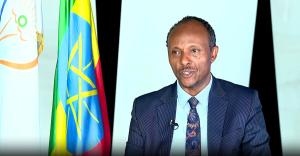
.jpg)
.jpg)
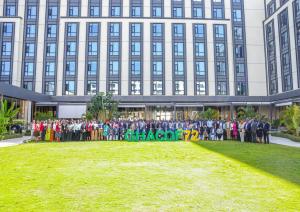
.jpg)
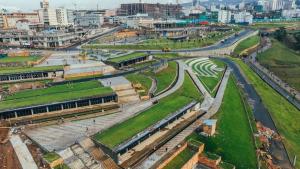
.jpg)
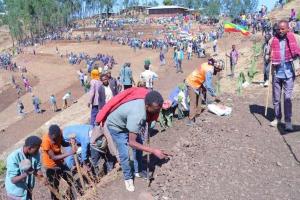

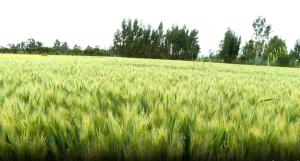

.jpg)
